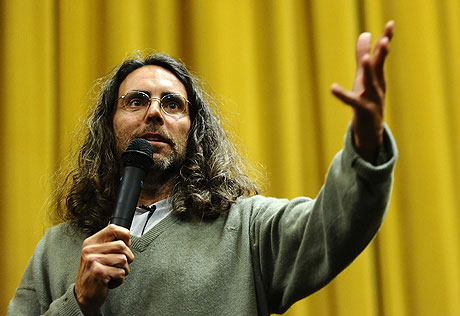A couple of years ago, film maker Tom Shadyac, known for blockbuster comedies like Liar Liar, Bruce Almighty, Patch Adams and The Nutty Professor walked into his luxurious new 17000 sq ft Beverly Hills home which had more bedrooms, bathrooms and uninhabited spaces than he would ever enjoy and he had an epiphany. That this success was just an idea devised by someone else. This was the extraneous fluff. Not the stuff of life and that he was no happier now than when he first began to make 1000 dollars a week as a joke writer for Bob Hope.
A bike accident further peeled away the illusions that material success brings. The illusion of power that comes from owning three homes, commuting by private jets and having the admiration and envy of millions of people. Success he realised is an inside job. As is happiness. And everything begins and ends within. The result was life changing.He moved into a mobile house, started giving away his money to those who needed it more than him and made a documentary called I Am, and asked questions relevant to each one of us.
Who am I?
What is wrong with the world that the more acquisitive, competitive, successful and ambitious we get, the emptier, lonelier and more disconnected we feel within?
And if something is going wrong with us, with the world that we live in, what can we do about it?
He learnt a few things during the making of the film.
First that the myth about human beings wired to survive at the cost of each other, is misplaced. That actually the human race is wired to connect, to cooperate.
That we are designed to live in democracies of ideas, not kingdoms.
That if we don’t follow what our heart desires at the deepest level, we will be destroyed.
That everything in Nature is organised around the principle of not taking more than what is needed. And yet only the human race plunders and takes more and more and then wonders why it is still unfulfilled.
How can we fix that? For the planet to heal, we must consume less, take from nature and from relationships only what we need. Define success in terms of what we want than being seduced by shiny collectibles that are sold temptingly over the counter.
For the film, Shadyac spoke with diverse thinkers, scientists, environmentalists and modern day philosophers and writers ranging from Desmond Tutu to Noam Chomsky and questioned the idea of manufactured success that rarely if ever honours people for the work they do, for their contribution to the world but puts a few on pedestals, creates a cult of fame around them and blindly wants to worship them because they somehow inhabit a larger-than-life idea.
In India we know something about that. Success has its perks and its clout and its layers of imperviousness but as Tom Shadyac’s film asked, does it define the value of a human being? And are we not part of the cycle that feeds the personality cults? Don’t we build temples for actors? Give away crores to cricketers in a country where farmers die of debts and hopelessness?
Don’t we allow criminals to occupy ministerial berths and actors to get away what in a manner of speaking is murder or attempted murder?
Like Tom Shadyac once said , “You guys have all the power. You have to stop elevating us. I don’t want to be your hero. I want to be your brother. I want to be your equal. And if you start seeing things as they are, it will change.”
It is however hard for us in India to see things as they are when it comes to cricket, to cinema, to religion. We are willing to abandon our sense of self, our understanding of right and wrong when the things that define us are threatened. We have come to believe that success needs no censor. We no longer admire collaborators. We worship aggressive competitors who win because at some level, we feel disempowered and want to be like them. Powerful men can be lawless and never have to be answerable to the law. What a fantasy to aspire to!
It is only the weak who have to compromise. Who must be shown their place in the celebrity food chain. Tom Shadyac’s I Am is an optimistic study of humanity. Hopefully, his faith in an intelligent, conscientious, connected heroism will become central to our reality one day. Where reality will not be an orchestrated show. And success will be an individual quest for personal truth rather than the ability to arouse mass hysteria.
 with The New Indian Express
with The New Indian Express
Reema Moudgil works for The New Indian Express, Bangalore, is the author of Perfect Eight, the editor of Chicken Soup for the Soul-Indian Women, an artist, a former RJ and a mother. She dreams of a cottage of her own that opens to a garden and where she can write more books, paint, listen to music and just be silent with her cats.






